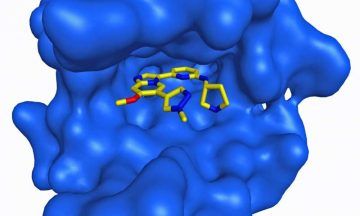From Phys.Org:
 Scientists from the National Institutes of Health and Cincinnati Children’s Hospital Medical Center have devised a potential treatment against a common type of leukemia that could have implications for many other types of cancer. The new approach takes aim at a way that cancer cells evade the effects of drugs, a process called adaptive resistance. The researchers, in a range of studies, identified a cellular pathway that allows a form of acute myeloid leukemia (AML), a deadly blood and bone marrow cancer, to elude the activity of a promising class of drugs. They then engineered a compound that appears to launch a two-pronged attack against the cancer. In several experiments, the compound blocked a mutant protein that causes the AML. At the same time, it halted the cancer cells‘ ability to sidestep the compound’s effects. The results, reported Sept. 4 in Science Translational Medicine, could lead to the development of new therapies against AML and cancers that act in similar ways.
Scientists from the National Institutes of Health and Cincinnati Children’s Hospital Medical Center have devised a potential treatment against a common type of leukemia that could have implications for many other types of cancer. The new approach takes aim at a way that cancer cells evade the effects of drugs, a process called adaptive resistance. The researchers, in a range of studies, identified a cellular pathway that allows a form of acute myeloid leukemia (AML), a deadly blood and bone marrow cancer, to elude the activity of a promising class of drugs. They then engineered a compound that appears to launch a two-pronged attack against the cancer. In several experiments, the compound blocked a mutant protein that causes the AML. At the same time, it halted the cancer cells‘ ability to sidestep the compound’s effects. The results, reported Sept. 4 in Science Translational Medicine, could lead to the development of new therapies against AML and cancers that act in similar ways.
Co-corresponding authors Daniel Starczynowski, Ph.D., at Cincinnati Children’s, Craig Thomas, Ph.D., at NIH’s National Center for Advancing Translational Sciences (NCATS) and their colleagues wanted to better understand drug resistance in a form of AML caused by a mutant protein called FLT3. This form of AML accounts for roughly 25% of all newly diagnosed AML cases, and patients often have a poor prognosis. A more thorough understanding of the drug resistance process could help them find ways to improve therapy options. FLT3 belongs to a class of enzymes called kinases. Kinases are proteins that play a role in cell growth and proliferation. When kinases work overtime, they can cause some cancers. Drugs that block kinase activity have been effective in treating cancers. While many of these drugs work initially, often in combination with other therapies, cancer cells frequently find ways to bypass the drugs’ effects and begin growing again. For many patients, this drug resistance can be deadly. FLT3 is always turned on in these cancer cells, sending chemical signals for the cells to grow and divide. Scientists have designed drugs to block FLT3 activity, but the AML cells eventually find ways to get the growth signals elsewhere.
More here.
